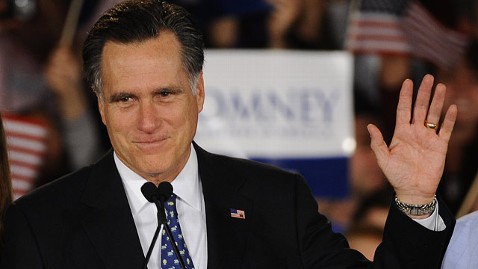Urging Romney to Be Transparent Could Spur Obama to Do the Same

(Image Credit: Emmanuel Dunand/AFP/Getty Images)
The slow drip of disclosures about Mitt Romney's background isn't just helping his Republican rivals scour his past for details. It's also setting up a convenient playbook for Democrats to use in a few months.
But advocates for government transparency caution that the more Democrats push for opening up Romney's past, the more they'll be expected to open up as well, particularly in the White House.
Romney has been dogged recently by demands that he release his tax returns. He refused to do so at first, and then he agreed to release a year's worth of returns. But he says he won't go as far as his father did and disclose tax forms for the past 12 years.
The inevitable question - what's he hiding? - is a familiar one for Romney, and there are an abundance of examples to which Democrats can point in a general election. Romney's return shows that he had a Swiss bank account; ABC News reported that he has money in the Caymans; he has refused to disclose the identities of his campaign's major bundlers; and when he was governor, his staff removed the hard drives from his office and wiped the administration's emails from the server.
Such issues complicate Romney's campaign as he demands that his chief rival, Newt Gingrich, reveal his own documents, be they Freddie Mac contracts or details from a 15-year-old ethics investigation. Democrats have consistently joined Romney's Republican rivals in asking him to disclose more about his background, although they do so from a vantage point outside a general election in which they could be hit by blow-back from critics who say President Obama hasn't been transparent, either.
Obama has his own struggles. He has spoken out against Washington's lobbyist culture, but his staff has met with lobbyists outside the White House to keep their names off the books; the administration has responded to relatively few amounts of requests for information; he has prosecuted leakers of information; the media have barred from fundraisers with rich donors; and he repeatedly refuses to take questions from reporters.
Transparency is not the most important concern for voters. But open-government activists say the public cares about that level of honesty because voters become easily suspicious when it appears that officials are hiding things.
And if Obama wages war on Romney for his private past, he might expect a predictable counter attack.
"I'd love to see him cast the first stone so it gets cast back at him," said John Wonderlich, the policy director at the Sunlight Foundation, which fights for disclosures in government.
Another part of Obama's open-government rhetoric has peculiarly disappeared. After the "Citizens United" Supreme Court case that allowed the creation of so-called super PACs, which can raise and spend unlimited amounts of money for elections, Obama trashed the decision as a move that would corrupt politics.
That was in 2010. The issue mostly vanished last year, and now as super PACs try to sway the Republican primary, Obama has been quiet; perhaps because two of his former White House assistants left his administration to start a super PAC of their own that benefits him.
That super PAC, Priorities USA Action, has so far spent more than $300,000 and has raised more than $3 million (most likely much more, but super PACs don't have to report how much money they have until the end of January).
"He warned us that outside money is going to change public service and corrupt politics," Wonderlich said. "And as soon as they started accepting outside money, the way he approached public service changed. … He's been corrupted by it."
White House spokesman Eric Schultz responded by pointing to an administration report on information requests it has granted and the visitor logs that the administration has made public.
Schultz said in a statement: "From the day he took office, the President committed his Administration to work towards unprecedented openness in government. Over the past two and a half years, Federal agencies have gone to great efforts to make government more transparent and more accessible than ever, to provide people with information that they can use in their daily lives, and to solicit public participation in government decision-making and thus tap the expertise that resides outside of government. While creating a more open government requires sustained effort, our continued efforts seek to promote accountability, providing people with useful information and harness the dispersed knowledge of the American people."
Democrats spent a significant amount of bandwidth Thursday advancing their line of attack on Romney's disclosures. The chairwoman of the Democratic National Committee, Debbie Wasserman Schultz, called a news conference in Florida to demand that Romney release a dozen years of tax returns and also his tax returns from his tenure at the private-equity firm Bain Capital.
The party also circulated a handful of news articles suggesting that the tax forms Romney has released raise questions, such as the details of how he made money between 1984 and 1999, and why he hasn't made them public.
"It could be useful and good when competitive candidates charge each other with not being transparent enough," Wonderlich said.